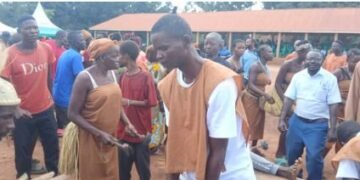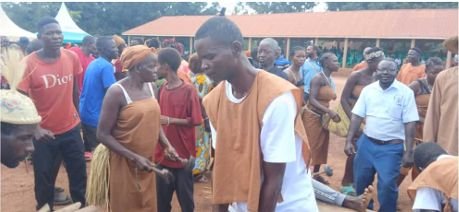A new chapter in the history of the Azande Kingdom and South Sudan’s cultural revival unfolded on Friday in Yambio, as the Kingdom hosted its first-ever Cultural Festival, drawing crowds from across Western Equatoria and neighboring states as well beyond Country.
The two-day celebration, themed “Celebrating Our Unity Through Cultural Diversity,” brought together hundreds of traditional dancers, chiefs, elders, youth, women’s groups, and cultural troupes representing various ethnic communities all gathered at Yambio Freedom Square to celebrate peace through art, song, and heritage.
The event, organized by the Azande Kingdom in collaboration with the Whitaker Peace and Development Initiative (WPDI) and local partners, the festival showcased the region’s diverse traditions from rhythmic drumming and spirited dances to handmade crafts and colorful attire all symbolizing unity in diversity.
Speaking during the opening, Charles Gamboripai Gideon, Minister of Culture, Youth, and Sports for Western Equatoria State, described the festival as a cornerstone for social healing in a state that has faced waves of conflict and displacement.
“This initiative brings our people together to celebrate the diversity that makes us strong, culture is not just entertainment, but it is medicine for our wounds, a reminder that unity and peace are possible when we embrace one another,” Minister Gideon said.
He encouraged the Kingdom and partners to make the cultural festival an annual event, saying it could serve as a “bridge between generations and a symbol of hope for South Sudan’s peace journey.”
The Azande Kingdom, one of South Sudan’s most storied traditional institutions, was officially restored in February 2022, 117 years after the death of King Gbudue, who was killed by British colonial forces in 1905. His great-grandson, Atoroba Peni Rikito Gbudue, now leads the Kingdom as a unifying figure advocating for cultural preservation, youth empowerment, and peaceful coexistence.
The Prime Minister of the Kingdom (Baira Abanyaki), Prince Tadeo Mario Sasa, said the festival symbolizes not just Azande heritage, but the collective identity of all South Sudanese.
“This kingdom belongs to all the 64 tribes of South Sudan,” Prince Sasa declared. “We stand for unity, peace, and cultural pride. This celebration is not just for the Azande it is for every community that dreams of a peaceful and united nation.”
Representing WPDI, Dr. Mande Daniel, the organization’s Program Coordinator in Western Equatoria, warned against the dangers of division and hate speech, drawing lessons from past African tragedies that happened in Rwanda.
“We must never allow tribalism to destroy us, we are all South Sudanese, and our diversity is our strength. WPDI will continue to support every effort that promotes peace, reconciliation, and inclusive dialogue among our people,” he said.
Adding his voice, Sebit Anglo Obebe, the Azande Kingdom’s Minister for Other Tribes, commended the peaceful coexistence currently witnessed among communities in Western Equatoria.
“This Kingdom is not for the Azande alone it belongs to everyone who values unity and peace,” Obebe said. “Let us keep embracing each other beyond tribal lines. Together we are one people, one state, one nation.”
The event featured dazzling performances from schools and community cultural groups who presented traditional Azande, Balanda, Dinka, Acholi, Bari, and Avokaya dances, alongside songs of peace performed by Congolese community living in the Kingdom.
Women’s cooperatives displayed handcrafted baskets, pottery, and agricultural produce, showcasing the Kingdom’s growing focus on economic empowerment through culture and craftsmanship.
Observers and visitors from neighboring counties and organizations described the celebration as a model for grassroots peace building and cultural diplomacy in South Sudan.
Mr. Jacob Ginaba, one of the community elders present, expressed his happiness citing that.
“For years we have been divided by politics and conflict. Today, through culture, we are coming back together. Our children are dancing, our leaders are smiling this is the South Sudan we want.”
Analysts note that with over 60 ethnic groups, South Sudan’s cultural richness is both a strength and a challenge. The Yambio festival, however, demonstrates how culture can serve as a bridge for peace, identity, and nation-building.
As the drums echoed across Freedom Square and dancers waved the Kingdom’s flags high, one message resonated clearly unity begins with understanding and celebrating who we are.
The Azande Kingdom leadership announced plans to integrate cultural education into schools, promote traditional arts among youth, and host annual peace festivals across all Azande territories.
“Stability and development start with culture, when people know their roots, they can build a stronger future,” said one Kingdom Prime Minister.
With hopes running high, the Yambio Cultural Festival stands as a symbol of rebirth a proud reminder that peace, unity, and culture remain at the heart of South Sudan’s identity.












